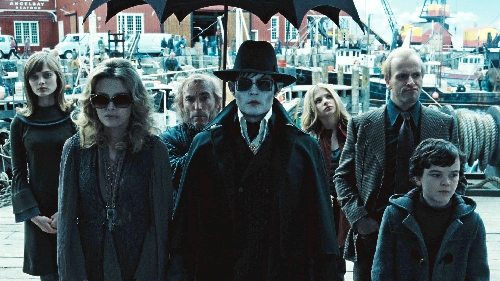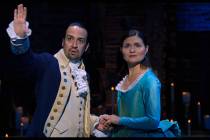‘Dark Shadows’ fails to do 1960s vampire drama justice

If we’ve learned anything from those weepy puddles of neediness on “The Bachelor,” it’s that it’s entirely possible to love too much.
That’s the underlying theme of “Dark Shadows,” in which 18th-century playboy Barnabas Collins (Johnny Depp) is turned into a vampire simply for having spurned an obsessed witch (“Casino Royale’s” Eva Green).
And it’s a message Depp and director Tim Burton should have taken to heart. Unabashed fans since their youth of the gothic soap opera that ran from 1966 to 1971, the duo seem too close to the project to let it breathe. And the resulting collaboration, their eighth, feels less like a summer blockbuster than really elaborate fan fiction.
After some expensive-looking backstory – Barnabas falls for the beautiful Josette (Bella Heathcote); the witch, Angelique, casts a spell to make Josette hurl herself off a cliff; Barnabas leaps after her but doesn’t die, revealing the vampire curse that leads to his entombment – the plot jumps ahead two centuries to 1972, when construction workers inadvertently free the vampire Collins.
These next moments, when a disoriented Barnabas is certain everything from car headlights to a gleaming McDonald’s sign is Satan’s way of coming for him, as well as his subsequent curiosity about “modern” conveniences, show the most promise and make up the bulk of the ads. But this isn’t the “Austin Powers”-style romp promised by the trailers. Virtually every light-hearted moment can be found somewhere in those clips.
It’s not their fault that Warner Bros. is marketing a movie different from the one they made, but the bait-and-switchery does shine a light on what could have been brought by filmmakers with less emotional investment in the source material. A “Dark Shadows” film doesn’t need to resort to “The Brady Bunch Movie”-level mockery, but, as early excitement for the trailers has shown, there’s substantial middle ground to explore.
Regardless, the “Dark Shadows” Burton and Depp did make is the largely joyless story of a man striving to restore the once great name that graces everything from the crumbling 200-room estate (Collinwood) to the Maine fishing village (Collinsport) his descendants call home. Not that they’re much to brag about, either.
Elizabeth (a regal Michelle Pfeiffer) does her best to hold together what’s left of the Collins line: her 15-year-old daughter, Carolyn (Chloe Grace Moretz), who wavers between disaffected and wasted; her deadbeat brother, Roger (Jonny Lee Miller); and Roger’s seemingly damaged 10-year-old son, David (Gully McGrath). They’re so decadently dysfunctional, they’d have their own E! reality show – if either E! or reality shows had existed.
Built for 100 employees, Collinwood now has three: a dim-bulb caretaker (Jackie Earle Haley), a live-in psychiatrist (Helena Bonham Carter) and a new nanny (Heathcote), who’s the spitting image of the doomed Josette.
And it turns out the family’s vast array of problems can be traced to the woman who outmaneuvered their fishing empire to seize the town. Angelique has spent the past 200 years destroying the Collins family as retribution for Barnabas’ rejection. Now, she’s determined to make him adore her once and for all, building to a violent love scene, the aftermath of which looks like something out of “Road House.”
Barnabas fits squarely in the eccentric Depp’s wheelhouse, adding to the collection of pale misfits – Edward Scissorhands, Sweeney Todd, Willy Wonka, the Mad Hatter – that manage to make those rumors of his portraying Michael Jackson seem plausible.
Realizing the uselessness of his trusted pickup lines – hearing she possesses “the most fertile birthing hips I’ve ever laid eyes on” no longer causes a lady to swoon – Barnabas sets out to woo nanny Victoria by adapting to his new environment. Reading “Love Story.” Seeking counsel from fireside hippies. Quoting from the Steve Miller Band’s “The Joker.” (“If only Shakespeare had been as eloquent,” he laments.) Barnabas throws himself headfirst into the 1970s like an undead Forrest Gump.
Pfeiffer, extending the welcome return she began in last year’s “New Year’s Eve” and that continues in next month’s “People Like Us,” proves she still can command a screen. HBO or FX should back a money truck up to her door while they still can.
But she and Depp are the exceptions.
Most of Miller’s role as the unfit father must have been left on the cutting room floor, as little David’s isolation lacks the intended punch. Green’s Angelique feels too much like one of Burton’s stop-motion characters. And when Jackie Earle Haley barely registers, you know there’s a problem.
Everything comes to life, so to speak, for a moment or two near the end.
But for the most part, much like Barnabas, this “Dark Shadows” lacks a pulse.
Contact Christopher Lawrence at clawrence@ reviewjournal.com or 702-380-4567.
Review“Dark Shadows”
113 minutes
PG-13; comic horror violence, sexual content, some drug use, language and smoking
Grade: C
At multiple locations












